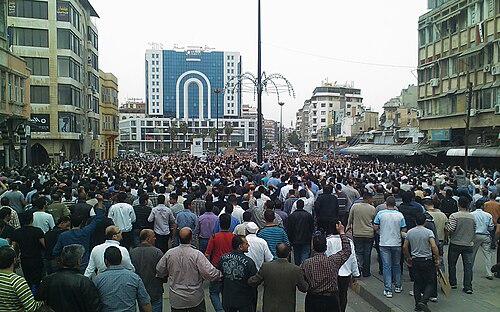Revolution Sweeps Syria as Assad Regime Falls, Igniting Regional Tensions
In a historic turn of events, the Assad regime in Syria has been toppled, marking a significant victory for rebel forces and altering the political landscape of the Middle East. This upheaval comes amidst a backdrop of shifting alliances and escalating conflicts across the region, raising concerns about the implications for stability and security in neighboring countries.
Background & Context
The fall of the Assad regime is the culmination of a decade-long civil war that has devastated Syria and displaced millions. President Bashar al-Assad"s government, which has faced immense international criticism for its brutal crackdown on dissent, has now lost its grip on power following a series of successful military offensives by opposition forces. This development not only signifies a major shift in Syrian politics but also poses questions regarding the future of governance and the potential for a new political order.
As the Assad regime crumbles, the region is witnessing a domino effect of upheaval. In Sudan, the Rapid Support Forces (RSF) have been pushed out of the Khartoum area, while in Ukraine, Russian advances in Donetsk continue to threaten the fragile peace. The repercussions of Syria"s revolution are likely to reverberate throughout the Middle East and beyond, as various factions and nations assess their positions in this rapidly changing landscape.
Key Developments
In Syria, the recent rebel victory has been characterized by a coalition of various factions uniting against the Assad regime, which has been weakened by years of civil strife. Reports indicate that rebel forces have made significant territorial gains, leading to the capture of key cities and military bases previously held by Assad loyalists. This swift change in control has prompted a surge of optimism among opposition groups, as they begin to formulate plans for a new governance structure.
Meanwhile, the humanitarian crisis in Gaza has intensified, with reports of famine and genocide raising alarm among international observers. The ongoing conflict in Gaza, coupled with the unrest in Syria, creates a volatile scenario that could further destabilize the region. As various factions vie for control, the potential for increased violence and suffering remains high.
\n\n
Image for Revolution Sweeps Syria as Assad Regime Falls, Igniting Regional Tensions
Broader Impact
The implications of these developments extend beyond Syria"s borders. In the Democratic Republic of Congo, the M23 rebel group has successfully conquered Goma and Bukavu, while in Mali, jihadist groups such as JNIM and IS are rapidly seizing ground. These movements are indicative of a broader trend of instability that has emerged in regions previously thought to be under control.
Experts are concerned that the fall of the Assad regime could embolden other rebel groups across the Middle East and North Africa, potentially leading to a resurgence of violent extremism. Moreover, the ongoing conflicts in Somalia, where al-Shabaab has launched major offensives, and the deteriorating situation in Ethiopia, where a peace deal between the Oromo Liberation Army (OLA) and the government offers a glimmer of hope, reflect the complex and interwoven nature of these crises.
What"s Next
As the dust settles in Syria, the international community is left grappling with the question of how to respond to this seismic shift. With the U.S. having previously engaged in military actions against the Assad regime, further involvement may be on the horizon. Recent developments in U.S. politics, including the possibility of intervention in various domestic issues, could impact the administration"s foreign policy decisions. Notably, recent developments suggest that the Trump administration may seek to leverage this moment to reshape its approach to global conflicts.
Looking ahead, the potential for new alliances and conflicts will be critical to monitor. As rebel forces consolidate their power in Syria, the question of governance and the future political structure will be paramount. Additionally, the response from neighboring countries, particularly Turkey and Iran, will play a crucial role in determining the stability of the region. The international community must remain vigilant as these developments unfold, as the consequences of the Syrian revolution are likely to have far-reaching effects on global geopolitics.

Image for Revolution Sweeps Syria as Assad Regime Falls, Igniting Regional Tensions


![[Video] Heavy clashes and gunfire reported in Baghdad, Iraq](/_next/image?url=%2Fapi%2Fimage%2Fthumbnails%2Fthumbnail-1768342239932-848qsh-thumbnail.jpg&w=3840&q=75)




![[Video] Gunfire between Iraqi security forces and Sadr militias in Baghdad](/_next/image?url=%2Fapi%2Fimage%2Fthumbnails%2Fthumbnail-1768343508874-4redb-thumbnail.jpg&w=3840&q=75)
